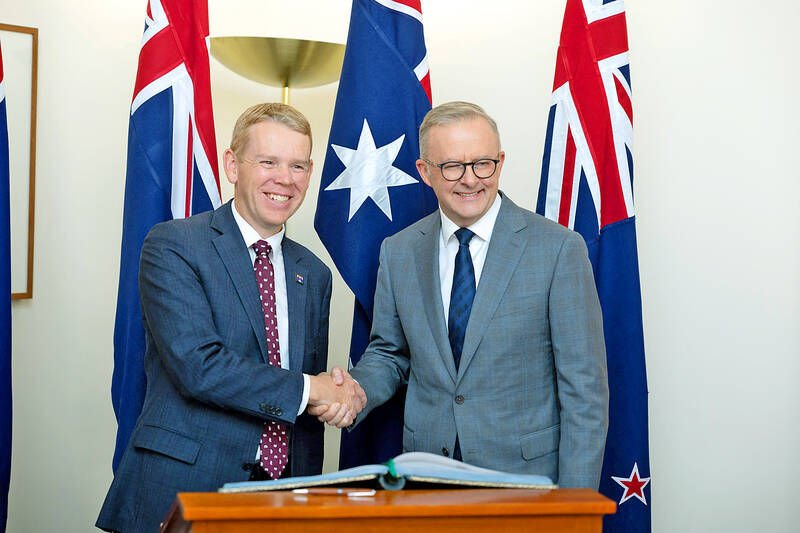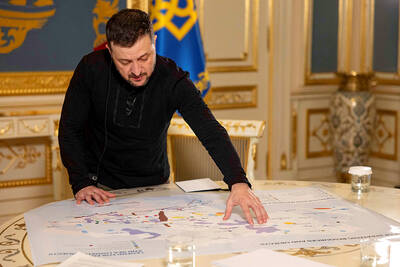The Australian and New Zealand prime ministers met yesterday to talk about China’s importance to their national economies, resolving to voice their disagreements with their most important trading partner that is becoming more assertive in their region.
New Zealand Prime Minister Chris Hipkins made Australia the destination of his first overseas trip as his government’s leader since his predecessor Jacinda Ardern announced her surprise resignation last month.
The visit to Australia’s Parliament House comes two weeks after Hipkins assumed office on Jan. 25. He used a joint news conference with Australian Prime Minister Anthony Albanese to give an assurance that he was keeping New Zealand’s foreign policy direction.

Photo: AFP
“Our foreign policy position hasn’t changed just because there’s a change of prime minister,” Hipkins said. “The government foreign policy is the same as it was under prime minister Ardern.”
A reporter put to Hipkins that Ardern had been reluctant to stand up against “bad behavior by China” and asked if he was concerned about Chinese coercion in the South Pacific.
“China is an incredibly important partner for New Zealand, a very important trading partner, and a partner in other areas as well,” Hipkins said. “That doesn’t mean there aren’t going to be areas where we disagree from time to time, and we’ll continue to voice our disagreements with China when that happens and we’ll always continue to strive to strengthen that ongoing relationship.”
Albanese said Australia’s national interests include restoring good trade and economic relations with China.
“Our position on China is clear, that we’ll cooperate where we can, we’ll disagree where we must and we’ll engage in our national interests,” Albanese said.
Albanese’s administration is rebuilding Australia’s trading relationship with China after bilateral ties plumbed new depths under the previous conservative government’s nine years in power.
Chinese and Australian trade ministers on Monday had their first meeting in more than three years in a major step toward normalizing relations.
Official and unofficial trade barriers on Australian products including coal, beef, seafood, barley and wood cost the nation’s exporters A$20 billion (US$13.9 billion) a year.
The barriers are largely seen as Beijing punishing the previous government for disagreements including Australian demands for an independent inquiry into the origins of and responses to the COVID-19 pandemic.
Some say New Zealand has avoided such trade retaliation by avoiding criticizing China.
New Zealand found itself on the defensive with its Five Eyes security allies — the US, Canada, the UK and Australia — in 2021 by resisting speaking out in unison with them against China on certain human rights issues.
Asked whether New Zealand was interested in being part of the AUKUS security partnership, currently between Australia, the US and the UK, Hipkins said his government’s position had not changed.
“Australia, the US, the UK are incredibly important security partners for New Zealand, but our nuclear-free policy hasn’t changed,” he said.
Additional reporting by Bloomberg

Thousands gathered across New Zealand yesterday to celebrate the signing of the country’s founding document and some called for an end to government policies that critics say erode the rights promised to the indigenous Maori population. As the sun rose on the dawn service at Waitangi where the Treaty of Waitangi was first signed between the British Crown and Maori chiefs in 1840, some community leaders called on the government to honor promises made 185 years ago. The call was repeated at peaceful rallies that drew several hundred people later in the day. “This government is attacking tangata whenua [indigenous people] on all

RIGHTS FEARS: A protester said Beijing would use the embassy to catch and send Hong Kongers to China, while a lawmaker said Chinese agents had threatened Britons Hundreds of demonstrators on Saturday protested at a site earmarked for Beijing’s controversial new embassy in London over human rights and security concerns. The new embassy — if approved by the British government — would be the “biggest Chinese embassy in Europe,” one lawmaker said earlier. Protester Iona Boswell, a 40-year-old social worker, said there was “no need for a mega embassy here” and that she believed it would be used to facilitate the “harassment of dissidents.” China has for several years been trying to relocate its embassy, currently in the British capital’s upmarket Marylebone district, to the sprawling historic site in the

‘IMPOSSIBLE’: The authors of the study, which was published in an environment journal, said that the findings appeared grim, but that honesty is necessary for change Holding long-term global warming to 2°C — the fallback target of the Paris climate accord — is now “impossible,” according to a new analysis published by leading scientists. Led by renowned climatologist James Hansen, the paper appears in the journal Environment: Science and Policy for Sustainable Development and concludes that Earth’s climate is more sensitive to rising greenhouse gas emissions than previously thought. Compounding the crisis, Hansen and colleagues argued, is a recent decline in sunlight-blocking aerosol pollution from the shipping industry, which had been mitigating some of the warming. An ambitious climate change scenario outlined by the UN’s climate

BACK TO BATTLE: North Korean soldiers have returned to the front lines in Russia’s Kursk region after earlier reports that Moscow had withdrawn them following heavy losses Ukrainian President Volodymyr Zelenskiy on Friday pored over a once-classified map of vast deposits of rare earths and other critical minerals as part of a push to appeal to US President Donald Trump’s penchant for a deal. The US president, whose administration is pressing for a rapid end to Ukraine’s war with Russia, on Monday said he wanted Ukraine to supply the US with rare earths and other minerals in return for financially supporting its war effort. “If we are talking about a deal, then let’s do a deal, we are only for it,” Zelenskiy said, emphasizing Ukraine’s need for security guarantees